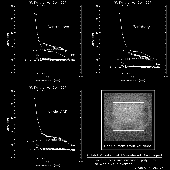
 |
Documentation > SXT Observation Notes > this page |
Image name: DARK_CURR_VS_FMS.png (click image to enlarge)
Image size: 48.9010 KB (900x900)
Date submitted: 14-Dec-1997

12/14/97
LWA
ORBIT VARIATION OF DARK SIGNAL IN DECEMBER 1997
The purpose of this test was to verify that the SXT dark signal variation
with time past sunrise (FMS = first minute of sun) still has the properties
reported in
show_pix/calibration/FMS_DARSIGNAL_CHANGE
show_pix/calibration/Orbit_Dark_Variation_1991
show_pix/calibration/Orbital_Dark_Variation
show_pix/calibration/Orbit_Dark_Changes
show_pix/calibration/orbit_dark_variation
The data, acquired between
(first, last) = ' 2-DEC-97 00:24:51', '12-DEC-97 16:22:53'
All images are AlMg darkframes with DPE=2 or DPE=27. The data acquired
between
(first, last) = ' 5-DEC-97 18:13:42', ' 5-DEC-97 19:12:24'
happened to be acquired in an orbit without any UV flood, providing a useful
control sample. These are indicated in the figures with triangles and
asterisks. ****They have had 10.5 added to their value for convenience in
plotting.****
The physical effect causing the strong decrease in dark current is charge
released from traps over a period of time after "charging" by the UV flood.
The smaller variation, indicated by the diamonds, may be caused by thermal
effect(?). The turn-up at sunset was noted in earlier studies.
The two upper plots demonstrate that the effect is stronger in the moderately
radiation damaged region. However, the old correction curve is adequate for
adjusting these data. The underestimate of the central dark signal if the
correction is based upon the whole CCD is less than 2 percent.. The
correction formula given in Orbital_Dark_Variation is normalized to the dark
current signal at FMS=30.
Finally, it is important to note that only the dark current changes. The
read noise must be subtracted off before the correction curve is applied.